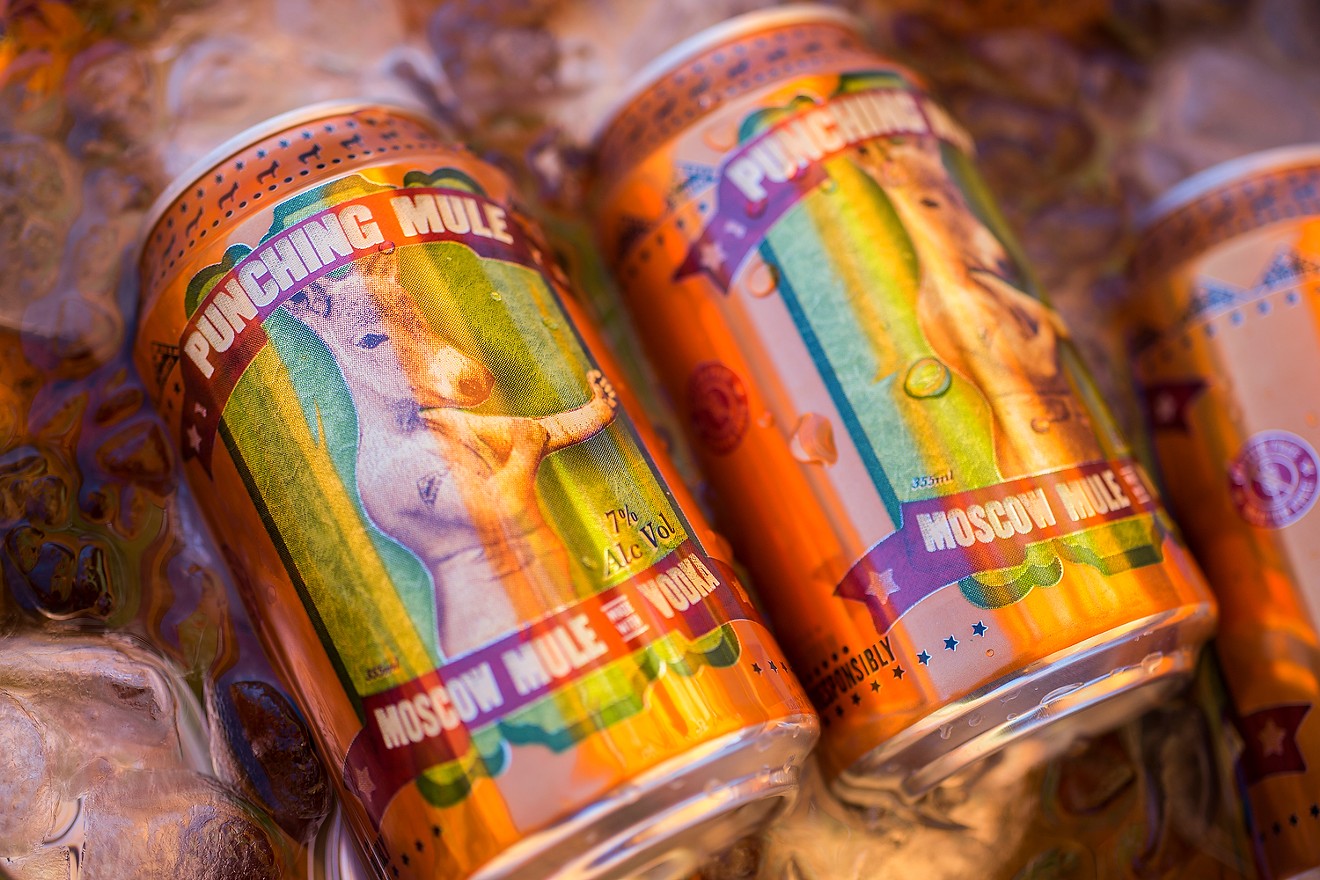Punching Mule advises consumers, "Don't be a jackass. Consume responsibly." But while the company that created America's first can-crafted Moscow Mule can pour it on, can it take a punch from one of its own?
According to a lawsuit filed in Denver District Court on November 6 by a dissatisfied Punching Mule investor, the company's founders used "Punching Mule as a mere sham for their own personal benefit and advantage." Larry Homuth is suing Punching Mule and founding members Joseph Von Feldt, Wyn Ferrell and Chase Campbell, who also own Mile High Spirits.
On its website, Punching Mule describes the beverage as "a premium can crafted, vodka-based Moscow Mule boasting natural flavors and packing a punch with 7% ABV." It's made with beet sugar, natural ginger and lime flavor, Rocky Mountain water and Elevate Vodka distilled by Mile High Spirits.
At the time of Punching Mule's launch, the Moscow Mule was the top cocktail in the U.S. Homuth became an early investor in February 2015, providing $233,000 of seed funding from his retirement account, partly because Campbell was his son-in-law at the time, but also because the proposition looked good, he says.
"I watched Mile High Spirits grow from a small distillery and tasting room to what they are now, so knowing that and the popularity of their products, I said, 'Let me see your numbers,'" Homuth recalls. "The numbers looked good, and I tasted it, and it tasted pretty good, too."
Other early investors included Homuth's sister and Von Feldt's elderly mother; they are not parties in the lawsuit. Campbell and Homuth's daughter filed for divorce in 2016.
Punching Mule lost $411,813 in its first year and $487,462 in 2016, according to the lawsuit. While the original Punching Mule business plan accounted for a rocky start, this was "a whopping $717,082 off from the projected $229,600 profit projected in the prospectus," the suit claims.
According to Homuth, Von Feldt reassured him that the business was cutting costs — including dropping a Pepsi Center sponsorship — and hoped to come back strong. Instead of the $1.9 million projected profit for 2018, however, the company lost another $63,762.
Through the start of this year, Homuth says he received conflicting messages from the company predicting "doom and gloom" in a changing market, followed by reassurances of profitability. Eventually, his requests for more information were met with a cease-and-desist letter from Punching Mule attorneys at Doida Law Group.
Doida Law Group declined Westword's request for comment, as did attorney Lauren Sykes of Nixon Shefrin Hensen Ogburn, who is representing Punching Mule in this case. Among other things, the suit asks Judge Eric Martin Johnson for access to company records, to appoint a receiver, and to order Punching Mule to cover Homuth's attorney's fees. And he wants to be compensated for his lost retirement funds.
Homuth, who is 71, says he will return to the workforce next week, to work a minimum-wage technical-services job. "This is not the retirement I had envisioned for myself," he notes. "I have a case of it [Punching Mule] in my fridge, but no one will drink it anymore."
[
{
"name": "Air - MediumRectangle - Inline Content - Mobile Display Size",
"component": "12017618",
"insertPoint": "2",
"requiredCountToDisplay": "2"
},{
"name": "Editor Picks",
"component": "17242653",
"insertPoint": "4",
"requiredCountToDisplay": "1"
},{
"name": "Inline Links",
"component": "18838239",
"insertPoint": "8th",
"startingPoint": 8,
"requiredCountToDisplay": "7",
"maxInsertions": 25
},{
"name": "Air - MediumRectangle - Combo - Inline Content",
"component": "17261320",
"insertPoint": "8th",
"startingPoint": 8,
"requiredCountToDisplay": "7",
"maxInsertions": 25
},{
"name": "Inline Links",
"component": "18838239",
"insertPoint": "8th",
"startingPoint": 12,
"requiredCountToDisplay": "11",
"maxInsertions": 25
},{
"name": "Air - Leaderboard Tower - Combo - Inline Content",
"component": "17261321",
"insertPoint": "8th",
"startingPoint": 12,
"requiredCountToDisplay": "11",
"maxInsertions": 25
}
]












